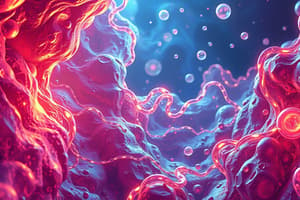Podcast
Questions and Answers
What is the primary purpose of the mastication process in rubber production?
What is the primary purpose of the mastication process in rubber production?
- To reduce the carbon content in rubber
- To increase the elasticity of rubber
- To enhance the color of the rubber
- To make rubber more fluid for easier processing (correct)
Which of the following is NOT a natural polymer mentioned?
Which of the following is NOT a natural polymer mentioned?
- Silk
- Cotton
- Polyethylene (correct)
- Cellulose
What transformation occurs during the vulcanization of rubber?
What transformation occurs during the vulcanization of rubber?
- The rubber becomes brittle
- The rubber's elastic properties improve (correct)
- The rubber becomes less viscous
- The rubber gains color intensity
How did Charles Goodyear's discovery impact the applications of natural rubber?
How did Charles Goodyear's discovery impact the applications of natural rubber?
Which of the following is a characteristic of natural polymers?
Which of the following is a characteristic of natural polymers?
Which natural polymer is associated with the structure of DNA?
Which natural polymer is associated with the structure of DNA?
What is a key benefit of the mastication process for rubber composites?
What is a key benefit of the mastication process for rubber composites?
Which of the following applications primarily utilizes the properties of rubber after vulcanization?
Which of the following applications primarily utilizes the properties of rubber after vulcanization?
Which classification criterion focuses on how the polymer chains are arranged?
Which classification criterion focuses on how the polymer chains are arranged?
What type of polymer is characterized by having junction points and varying degrees of branching?
What type of polymer is characterized by having junction points and varying degrees of branching?
What is a defining feature of dendrimers in the context of branched polymers?
What is a defining feature of dendrimers in the context of branched polymers?
Which type of polymer includes materials like branched polyethylene and branched polypropylene?
Which type of polymer includes materials like branched polyethylene and branched polypropylene?
In the context of polymer applications, what is a potential use of branching in molecules?
In the context of polymer applications, what is a potential use of branching in molecules?
What are the small molecules that make up macromolecules in polymers called?
What are the small molecules that make up macromolecules in polymers called?
Which of the following synthetic polymers is commonly used in the production of plastic pipes?
Which of the following synthetic polymers is commonly used in the production of plastic pipes?
Who is recognized as the Father of condensation polymers?
Who is recognized as the Father of condensation polymers?
What is an application of polymers that has gained attention in recent years?
What is an application of polymers that has gained attention in recent years?
Which of the following polymers is used in the production of artificial bone substitutes?
Which of the following polymers is used in the production of artificial bone substitutes?
What process is utilized to enhance the properties of rubber by adding sulfur during manufacturing?
What process is utilized to enhance the properties of rubber by adding sulfur during manufacturing?
What property of polymers generally decreases as molecular weight increases?
What property of polymers generally decreases as molecular weight increases?
Which synthetic polymer is commonly used in making lightweight, high-strength materials for aerospace applications?
Which synthetic polymer is commonly used in making lightweight, high-strength materials for aerospace applications?
Which of the following polymers is a famous example of a thermosetting plastic?
Which of the following polymers is a famous example of a thermosetting plastic?
What type of polymer can naturally occur in nature and is often used for its biodegradability?
What type of polymer can naturally occur in nature and is often used for its biodegradability?
Flashcards are hidden until you start studying
Study Notes
Introduction to Polymers
- Polymers are macromolecules composed of monomers, which are small molecules.
- Examples of natural polymers include DNA, RNA, proteins, cellulose, cotton, and natural rubber (polyisoprene).
Historical Milestones
- Thomas Hancock (1820) observed that mastication (repeated high shear forces) increases fluidity of natural rubber, improving molding and blending processes.
- Charles Goodyear (1839) discovered that heating natural rubber with sulfur (vulcanization) enhances elasticity and reduces tackiness, expanding its applications.
Contributions to Polymer Science
- Hermann Staudinger synthesized important polymers like polyoxymethylene and polystyrene, demonstrating the macromolecule structure of polymers.
- Wallace Carothers is recognized as the father of condensation polymers, particularly polyamides and polyesters.
- Hermann Staudinger and Paul Flory received Nobel Prizes for their contributions to polymer science (1953 and 1974, respectively).
Synthetic Polymers
- Popular synthetic polymers include polystyrene (PS), polyethylene (PE), nylon 6,6, polyvinyl chloride (PVC), and silicones.
- Polytetrafluoroethylene (PTFE or Teflon) and polymethylmethacrylate (PMMA) are also widely recognized.
- Current trends in polymer development focus on biomedical applications, electronics, aerospace, and environmentally friendly green polymers.
iPhone SE 2016 Disassembly
- Key components include a camera module, logic board, graphite sheet for cooling, and metallic heat shield.
- A9 Processor is used in the device, which undergoes heating for component detachment during dismantling.
Polymer Classification Criteria
- Polymers can be classified based on origin, skeletal structure, repeat unit, thermal processing behavior, and molecular arrangement.
Skeletal Structure of Polymers
- Types of skeletal structures:
- Linear polymers (e.g., polyethylene terephthalate/PET)
- Non-linear polymers, including:
- Cyclic/ ring polymers (e.g., cyclic silicones)
- Branched polymers (e.g., branched polyethylene)
- Network polymers (e.g., epoxies)
Branched Polymers
- Branched polymers can have varying degrees of branching (low to high).
- Examples include branched polyethylene and polypropylene.
- Dendrimers and hyperbranched polymers have controlled branching, useful for applications like targeted drug delivery and varying molecular properties.
Studying That Suits You
Use AI to generate personalized quizzes and flashcards to suit your learning preferences.




